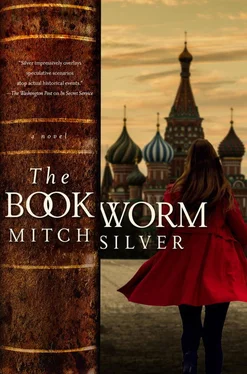I laid it on the line. “That’s precisely what I mean. With your help, I intend to present Churchill with something very like a fait accompli as far as the book itself is concerned. Otherwise, the thing would be too fantastical for the PM to grasp. It’s almost too fantastical for me to grasp.”
“Then, come with me.” Abruptly turning on his heel and with a brusque “beg pardon” to the small knot of people standing in front of a door directly under the staircase, he led me down an interior flight of steps, saying, “When the nobs lived here, these were the kitchens and pantries. It’s easier to control the temperature and humidity down here than it is upstairs.”
I was a little slow keeping up. Blunt stopped and looked back. “I said I was giving you the shilling tour. Don’t you want your money’s worth?”
We made our way through a warren of storage rooms, some still with washing-up sinks in the corners, that were lit by a few bare bulbs. Paintings in their frames were stored on their sides in the first of these rooms, dozens of them chock-a-block. Unframed canvases were rolled up in cardboard tubes and stacked in pyramids, like so many wine bottles in the caves of a French chateau. In another room were altarpieces, disassembled and leaning against the walls three deep. Blunt waved his hand. “Italian on this side, German over there.”
The next set of rooms held leather-bound books from floor to ceiling. “All of this is available for study.” He began ticking off the centuries as we walked: “ Ottocento, settecento, sei, cinque …” We walked through a door into another, similar room. “Still cinquecento. Notice anything?”
I looked around. All I could see were more leather-covered volumes. Maybe these were a little thicker than the previous ones. “I don’t know what I’m looking for,” I admitted.
Blunt beamed, the teacher indulging the dull student—something I’m sure you’re familiar with, Robert, having been my maths tutor that lamentable winter term. “We’ve left paper and now we’re in vellum. That door we just walked through was the year 1450.”
When I didn’t know enough to go “ooh” or “aah,” Blunt grew peevish. “The printing press, man. Movable type. Everything from here on is pre-Gutenberg. Handwritten and illuminated.” Whilst the twentieth century was going about its business upstairs, we had traveled back five hundred years in the time it took to walk from the front of the old kitchens to the back.
“Think of it,” Blunt was saying. “It’s always the year 1375 where you’re standing. Westminster Abbey is still unfinished. Martin Luther won’t be born for another century. Constantinople is still—well, you get the idea.”
I got the idea. It was a boring idea, but I got it. I followed Blunt, who was walking toward five or six large canvas carts of the sort commercial laundries employ. Inside each were more volumes piled one on top of another, willy-nilly. In all, there must have been three hundred old books in the carts.
My guide waved his hand over them. “Depressions aren’t bad for everyone. They’re quite good for art historians. We picked these up for a song. And it’s not just private collectors; the Catholic Church are hurting quite badly just now. Those three hold the contents of a monastery that closed in ’38. Of course, with a war on, I have no one to do the cataloguing. So here they sit.”
Blunt crossed his arms. “Our tour ends here. Noël, I thought you ought to know what we’re up against. If you want me to fabricate something, it had better look right and feel right and smell right if it’s going to fool the Germans. Their art historians are the best in the world.”
I knew I musn’t say what I was thinking, but you know enough about me to know I said it anyway. “Smell right?”
Blunt grabbed a heavy book at my elbow. He opened it and immediately slammed it shut again. The dust and whatever else was in there nearly choked your humble correspondent. I coughed and then sneezed for nearly half a minute. When I finally could get the words out, I managed to say, “It smells something horrid.”
“Mold.” Blunt was triumphant. “Fourteenth-century mold. If you don’t have mold, the boys in Berlin will know it straight off.” He put the volume back where it had been. “I’ve read the things you left with me in the bag from the toy store. You were quite right to do so—I find this sort of thing to be child’s play.” The man was simply insufferable.
He turned on his heel and walked back through the door by which we’d come, the one he’d said was the year 1450. I found him fingering the volumes along the left-hand wall. He extracted a book from the shelf, opened it, and closed it again almost immediately, gently this time. He said, “Do what I’m doing on the next shelf down. Look for one with a hole in the flyleaf.”
I did as I was told.
Blunt pronounced, “I have a stratagem.”
It was at least thirty seconds before Lara was aware the cylinder had run out. And, lost in thought, another minute before she realized the Arkhiv was closing. She packed her things and walked the six tins containing Noël Coward’s words back to her cubicle before locking them up, wishing the Englishman a pleasant evening.
Chapter 19

Five hours later, Lara found herself trapped in a nondescript dance club way out on Ulitsa Shchepkina, all glammed up in one of Vera Lebedova’s slinky Diane von Furstenberg wrap dresses and pasting her last smile of the evening on her face before sitting down.
Her so-called friend had gotten her into this evening of “mixing and mingling” as the price of going through her closet and borrowing clothes for Friday morning’s telecast. Vera had said, “I just happen to be signed up for this thing tonight. You should come.”
“Thing?”
“A flirt party. They’re fun, a way to meet guys. You remember guys, don’t you?”
“I’ve still got a guy. At least until he signs on the dotted line.”
“You think that’s keeping your no-good Viktor home nights? Larashka, you’ve been a hermit long enough.”
Her final “flirt partner,” waiting at Table 14, was a handsome enough guy, blond like a lot of Russian men but with unusual dark gray eyes. He’d clearly polished off most of the bottle of vodka that was on the table, and was leering at her through eyes at half-mast. It occurred to her as she sat down that the only difference between Moscow flirt parties and American speed dating was that, over here, the women did the moving while the men sat. The leers were identical.
His nametag read “Yuri.” Lara fingered the sticker on her blouse that read “Larissa.” No last names or even patronymics allowed. The Master of Ceremonies rang his bell and the guy jumped right in. “I like men without hats.”
Wait… was this a test? Lara smiled a little and said, “So do I. I notice you’re not wearing one.”
“No, I mean I like Men Without Hats, the ’80s band. They’re in Moscow this week and I’ve got two tickets.”
“Aren’t we supposed to get to know each other first?”
“What’s to know? I dig Eurasian chicks.”
“So do I.”
That threw him. Lara followed with, “The Eurasian Chicks, that country band from Kazakhstan. Know them?”
He didn’t laugh, he didn’t chuckle, he didn’t do anything for about ten seconds. Then all he managed was a surly “I don’t think so.” Men. Can’t live with them, can’t use them for firewood, as an American friend used to say.
So much for lively banter at Table 14. She couldn’t wait to share a laugh about it with Vera, who was just at that moment being chatted up by the hottest guy in the room. Easy for her. Vera Lebedova was pretty in a Maria Sharapova sort of way, blond and willowy. “ Lebed ” was Russian for “swan,” and her long, elegant neck lived up to the name. Guys fell all over themselves for her.
Читать дальше













